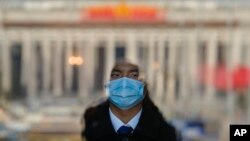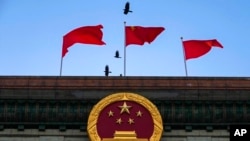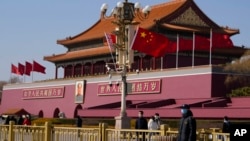China’s annual parliament, which opens Sunday, will usher in the biggest government reshuffle in a decade, as well as a sweeping organizational overhaul that will bolster the Communist Party’s control.
Although Chinese President Xi Jinping has already secured a norm-breaking third term as party chief and stacked the party’s elite politburo with his allies during its twice-a-decade congress in October, the rubber-stamp National People’s Congress will formally endorse Xi as president and his allies in the government’s top echelon of power.
Li Qiang, a Xi ally who was previously the Communist Party chief in Shanghai, is all but certain to become premier, replacing Li Keqiang, who will step down after two terms. Li Keqiang will deliver his last Government Work Report at the opening of the NPC.
Li Qiang, to be in charge of managing the world's second-largest economy, will face severe challenges as it has been adversely affected by its draconian zero-COVID policy over the past three years. China’s GDP last year grew just 3%, way off the official target of 5.5%.
“Having suffered a very poor result of 3% growth rate in 2022, the two premiers Li [Li Qiang and Li Keqiang] are expected to project a 5% to 5.5% growth rate this year,” said Willy Lam, a senior fellow at the Washington-based Jamestown Foundation.
Lam said after three years of economic shrinkage in such key areas as exports, infrastructure, real estate, and consumer spending, the government is facing a fiscal crisis and Li Qiang “will likely follow the time-honored principle of government investment to jack up growth.” Analysts say measures aimed at boosting consumption and foreign investment are likely to be implemented.
Xi is also expected to consolidate his power in China’s government by filling key posts with trusted party allies and loyal state officials, including the National Development and Reform Commission, the top economic-planning body; the People’s Bank of China, the central bank, and the Ministry of Finance and Ministry of Science and Technology; said the Germany-based think tank, Mercator Institute for China Studies in a brief.
Executive Vice Premier Han Zheng is expected to be replaced by Ding Xuexiang, another close ally of Xi.
The NPC is also expected to approve military spending and the government budget, and set the tone for economic policy in the year ahead.
However, by far the most important changes to expect at the coming NPC would be the boosting of the Communist Party’s control in Xi’s reorganization of state and Communist Party entities, analysts say.
A communique published at the end of a three-day meeting of the party's central committee Tuesday stressed the importance of institutional reform to “bolster the centralized and unified leadership of the Party,” according to the official Xinhua news agency.
Analysts say this will likely entail the incorporation into the Communist Party system of more government ministries, especially in the realm of finance and policing, and the national security apparatus.
“The administrative restructuring will further institutionalize CCP oversight over policymaking, with the areas of financial policy and national security, in particular, being put on a shorter leash,” said Nis Grünberg, lead analyst at the Mercator Institute for China Studies.
Chen Daoyin, a former associate professor of political science and law at Shanghai University who is now living abroad, said Xi’s move is “subverting” the spirit of the “reform and opening” policy launched in 1978 that saved China from the brink of economic collapse after the Cultural Revolution and paved the way for its stellar economic rise.
Led by paramount leader Deng Xiaoping, the “open door” policy included sweeping market reform and political liberalization measures intended to separate the powers between the party and the government and diminish the party’s role in the government’s operation. In a party speech in 1980, Deng denounced the over-extension of the party’s authority in the government and blamed it for leading to the disasters of the Cultural Revolution.
“It is going against the ‘reform and opening’ drive, which aimed to take power from the hands of the government and return it to society,” he said.
“Deng was opposed to the kind of institutional reform that Xi is now carrying out. The system that has proven a failure in the three decades under Mao … and now Xi wants to do it all over again,” he said. “For the sake of maintaining stability, Xi wants to bolster control.”
Xi has famously said that the last 30 years of reform should not be used to “negate” the first 30 years of communist rule -- making clear his refusal to criticize the atrocities and catastrophes committed during the Mao era. These include the Great Leap Forward that resulted in a famine that killed between 30 million and 40 million people and numerous political campaigns, including the Cultural Revolution, that persecuted and killed millions.
The communique released Tuesday also emphasized the “uncertainties and unpredictabilities” that China faces amid a “new period of turmoil and change” in international politics – stoking a sense of crisis that is often accentuated in party documents and leaders’ speeches. “We must be prepared to withstand the great test of high winds and even rough seas,” it said, saying the country’s economy faces multiple pressures and “the foundation for economic recovery is not yet solid.”
In contrast with Deng’s prioritization of the economy, Xi is “sacrificing development for the sake of security,” Chen said.
Hong Kong’s Mingpao newspaper last week speculated that under the organization overhaul, the ministries of public security and state security may be eliminated from the State Council – government – system and incorporated into the Communist Party’s newly created Central Internal Affairs Committee, which will have functions similar to Russia’s Internal Affairs Ministry. That ministry is responsible for law enforcement in Russia, including the police.
While this cannot be confirmed until the NPC, analysts say it is not improbable, given the party leadership’s emphasis on national security.
Deng Yuwen, a political commentator and former deputy editor at party journal Study Times, said Xi’s move to formally incorporate party leadership into the government structure was motivated by a desire “to preserve the party and [hence] his own authority.”
“Any major problems in the party will weaken and threaten his own power, so he must ensure that the party's rule is unshakable,” he wrote in a commentary carried by the German-based news outlet Deutsche Welle.
Now that China is facing geopolitical threats, including U.S. restrictions over trade and technology, Xi is determined to tighten the party’s control over the financial, technology and national security realms to nip in the bud any attempts by his political opponents to threaten his authority, he wrote.
















